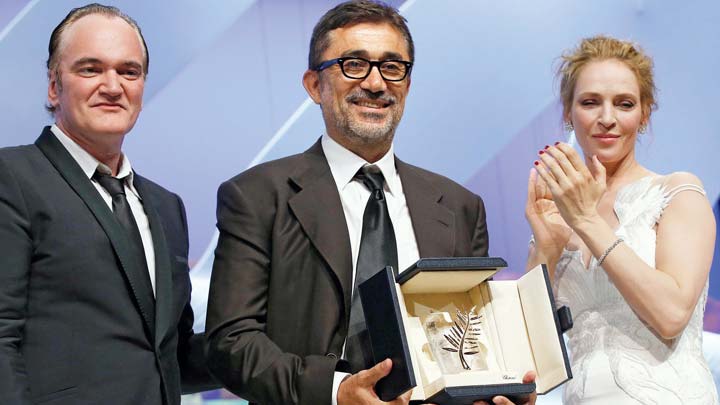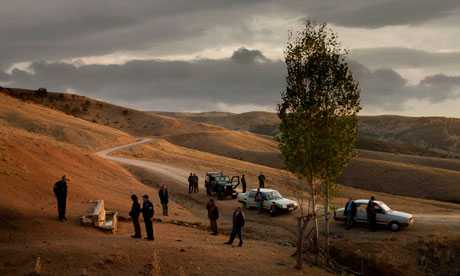It won the Cannes grand prix – but people have been walking out of Nuri Bilge Ceylan’s Once Upon a Time in Anatolia. Stuart Jeffries finds him unrepentant
‘The problem with Hollywood,” says Nuri Bilge Ceylan, “is the audience expects to get the answers like a pill. They expect to know not just whodunnit, but the motives of the characters, the how and why. Real life is not like that. Even our closest friend – we don’t know what he really thinks. In films we want more than in real life, everything being made clear. That means this kind of cinema is a lie. I cannot make cinema that way.”
I had asked the 52-year-old Turkish director to explain why his new film Once Upon a Time in Anatolia, which won the grand prix at Cannes last year, refuses to provide answers. It’s an epically lugubrious, austerely beautiful 157-minute police procedural in which a murder suspect is driven around the Anatolian steppes at night in a convoy of police cars, to find the place where he and his brother buried their victim. Along the way, we learn lots of increasingly gloomy things: what kind of yoghurt the cops like, how Turkey will need to reform itself to join the EU, that the local doctor likes to quote Russian poetry – but not who did what to whom and why.
“I know my films can be difficult and exasperating,” says Ceylan with a smile as we sit in a London hotel. Indeed. Some people have walked out during the autopsy scene, on account of all the unpleasant squelching that forces viewers to imagine the grisly visuals the camera is refusing to capture.
One of the most striking things about the film, though, is the fact that, while all the protagonists are men, it is women who drive the story. The murder was probably committed because of a woman. The prosecutor’s wife (again probably) committed suicide on the same day her child was born, in revenge for her husband’s infidelity. And, in one key scene, a small-town mayor supplies the investigators with a night-time meal at which his beautiful daughter dispenses tea. The men all seem to have a religious epiphany as they see her candlelit face. What was that about? “If you see a girl like this in London, it wouldn’t influence you. There are many beautiful girls around. In the desert, when a girl like that, at the end of a long night, appears like a madonna in your ordinary world, that moment has the sense of a miracle.”
This notion also helped them solve a script problem. “We couldn’t work out why the guy confesses where the body is at that point. We wanted to find a realistic reason. So we talked with a police chief in Anatolia. And he told this story, ‘Sometimes I’ll beat a suspect for three days and they don’t even say one word. Then they hear a child or see a woman. Suddenly they cry and want to confess everything.’” Because of her beauty and her seeming compassion? “Definitely. In The Brothers Karamazov, you remember, Dmitri wakes up and realises somebody has put a pillow under his head. That makes him confess to a murder he hasn’t committed.”
There are autobiographical elements to the film: the all-male milieu, for instance, is partly based on Ceylan’s experience of military service. But then Ceylan has often plundered his life for material. In 2000’s Clouds of May, about a film-maker incessantly filming his parents, his mother and father played the parents. Ceylan readily admits it was a self-critical film: “In my first film, I had taken all these images of my family and used them. And when I looked at what I’d photographed back in Istanbul I saw that I had taken and given nothing back. My grandmother was trying to talk to me and I wouldn’t listen while I was filming. I was very selfish and I wanted to make a film about that.”
Uzak, two years later, was about a seemingly sophisticated and successful Istanbul photographer called Mahmut (clearly modelled on Ceylan), who is visited by his unemployed, uneducated cousin Yusuf. There’s a terrific scene in which Mahmut puts on a video of a Tarkovsky movie to impress his cousin, who gets bored and leaves. As soon as he does so, Mahmut flicks over to porn. In 2006’s Climates, Ceylan appears opposite his wife in an unremitting drama about a marriage on the skids, again clearly based on his own.
“After a while, I ran out of autobiography,” he says, “so I started making other films.” Three Monkeys, in 2008, was the first, a marvellously taut existential drama about denial and desire in which a politician’s driver takes the fall when his boss kills a pedestrian while asleep at the wheel. The second post-autobiographical film is Once Upon a Time in Anatolia – or it would be if its lead were not so evidently steeped in Ceylan’s melancholic sensibility. “I can’t help that. When you construct a character, you look at the person you know best: yourself.I decorate each character with weaknesses of the human soul and, to check whether those decorations are true, I look at myself.”
Near the end, there’s another miracle. The doctor, after a long irksome night, walks out into the small town where he has lived for a year or so. He sees it as if for the first time: an awning flaps in the wind, the breeze carries a flock of birds into the sky. “That feeling I know very well,” says Ceylan. “Sometimes everything touches you completely differently. That is what the melancholy want – to feel they exist.”
Guardian


